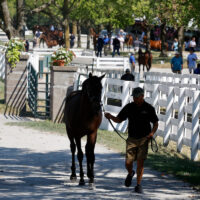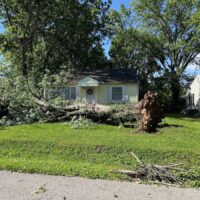A new philanthropic organization will roll out $10 million in grants to rural communities and small towns in 2024, funding projects aimed at enhancing civic participation.
The Trust for Civic Life, a collaborative that launched in February, funds small town entrepreneurs, cultural centers, hobby groups, and public venues to create avenues for community participation.
The trust is currently reviewing its first round of nominations for funding, and a second round of nominations will open in August.
Executive Director Charlie Brown wants the Trust for Civic Life to help communities achieve their goals and build trust among the residents, creating the conditions he sees as “the day-to-day practice of democracy.”
Democracy is not just about “Donald Trump and Joe Biden in an alley fighting it out,” Brown said. It’s about routine, everyday participation in one’s community and how people build relationships across political and social divides.
- SUBSCRIBE: Sign up for our newsletters
“The most important part of our democracy is how we come together every day with people who we may not agree with to identify a problem and work together to solve it. That is what our democracy is,” Brown told the Daily Yonder in a phone interview.
Our common purpose
In 2020, the American Academy of Arts and Sciences released findings from a series of listening sessions in 50 U.S. communities, from small towns to urban centers. Titled Our Common Purpose, the report identified key opportunities and impediments to participating in civic life.
(The report was the work of the academy’s bipartisan Commission on the Practice of Democratic Citizenship, whose members included academics, nonprofit and business leaders, journalists, and others from diverse backgrounds. Dee Davis, publisher of the the Daily Yonder and president of the Center for Rural Strategies, served on the commission.)
The report recommended six strategies to enhance the health of American democracy. The strategies included things like empowering voters, achieving equal representation, and building civic relationships.
Despite pockets of division and hyperpartisanship, the listening sessions found that there were “[surges] of participation and innovation, of communities working to build new connections across long-standing divides.” Among the people who participated in the listening sessions were local government officials, political activists, scholars, teachers, business owners, and more.
The Trust for Civic Life grew out of the strategies that Our Common Purpose recommended for efforts to work in rural places and small towns.
Building trust
“I think we have a track record in this country where if you live in a rural community, you probably have a good reason to believe that institutions haven’t always served you,” Brown said.
Rural places haven’t always received their fair share of government funding to support things like public education, infrastructure, healthcare, and broadband internet, among other things.
“So there’s a very legitimate historical and generational experience that says, ‘Why should I trust institutions?’” Brown said.
Brown said that civic projects can help build back that trust, especially when those projects involve community institutions like law enforcement, local government, religious leadership, or teachers.
People have to be involved in the solutions to community issues where they get to witness the fruits of their labor, Brown said. That builds trust.
Strengthening the rural urban connection
Another way to build trust is to create relationships between rural and urban communities. For this reason, the Trust for Civic Life is interested in funding projects that strengthen relationships across geographic and social boundaries.
Rural farmers with connections to urban food markets might apply for a grant to fund projects in hospitality, for example. The farmers and the restaurateurs could create a relationship that emphasizes things they both care about, like the quality of the food and the experience consumers have while eating it.
“And that’s going to build trust faster than anything else we can do,” Brown said.
In rural areas where maternal wards are closing because of lack of funding, urban hospitals can build out programs to fill in staffing shortages. Brown said it’s all a part of the process of forging connections to build trust between rural and urban people.
“It builds the relationships and the relational sort of social fabric that carries these stories and carries this trust back and forth,” Brown said.
Rural communities have a hard time getting grants
Rural communities struggle to compete with larger and more resourced communities for federal grants, which often require a large match, something that’s not feasible for all small towns. Another obstacle is that a lot of rural organizations and municipalities lack the staffing and resources that larger ones do, so they might not have a full time grant writer and unrestricted funding, Brown said.
“Some other things we heard was ‘I just don’t have a lot of time,’” Brown said. “‘I need to go do the work, not try to fundraise for the work.’”
To resolve these challenges, the Trust for Civic Life uses a nomination process, not a traditional grant application system. Instead of requiring small organizations to create a lengthy application, the trust requires interested parties to be nominated by an individual or organization in the Trust for Civic Life network.
The trust then invites nominated organizations to fill out a pre-application, which includes a series of short multiple choice questions. Groups interested in funding grants can also self-nominate if they don’t have existing connections with the trust.
“[The nominators] oftentimes have their roots in a rural community and are deeply embedded in it,” Brown said. “Our hope is that over time, it takes away the weight on the potential grantee of having to fill out a long application process and feeling like they don’t know anybody who’s a part of the actual system or decision making.”
Brown said it’s important they build out the nominator network over a number of years by allowing former grantees to also be a part of the nomination process.
The Trust for Civic Life also reduced the grant acquisition burden by only giving out unrestricted grants. In other words, grantees can use their funds for a variety of purposes instead of a narrow set of tasks.
Who can apply?
Funding from the Trust for Civic Life is open to any group committed to serving their community, even hobby groups that don’t have an official 501(c)3 status. A quilting club that runs out of someone’s home could be eligible for a grant if they’re getting people involved in their community, for example.
The grants are intended for rural communities and small towns, broadly defined. Brown said that strict definitions of rural or small town set arbitrary population thresholds that exclude communities that should otherwise be eligible for funding. The Trust for Civic Life leaves the rural identification criteria up to individual communities.
“One of the things we heard pretty consistently was frustration with federal or sometimes even state definitions of what is rural,” Brown said. “They know if they live in a rural area or not. And we should let them decide.”
The second round of grantmaking, which will focus on individual efforts and civic innovation, will open in this summer (2024). Projects can be for up to $25,000.
Funding for the Trust for Civic Life has come from sources such as Rockefeller Brothers Fund, the Omidyar Network, and Stand Together.
This article first appeared on The Daily Yonder and is republished here under a Creative Commons license.






